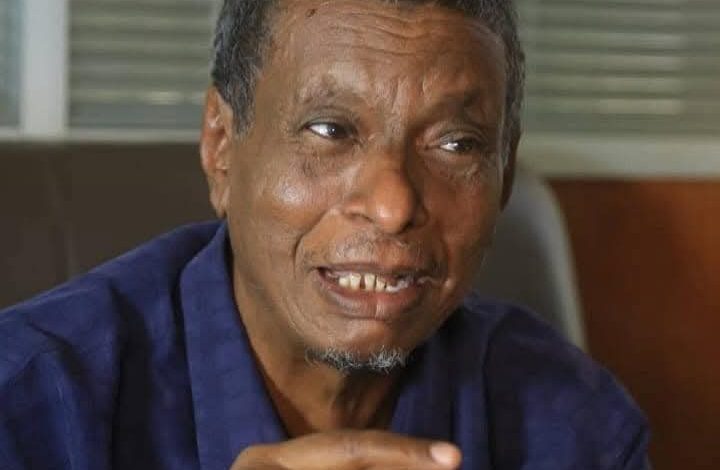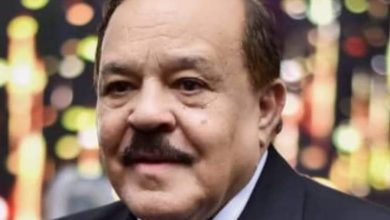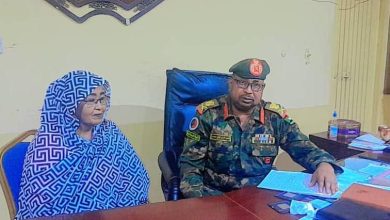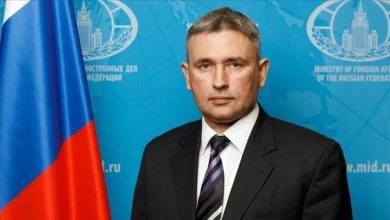Interviews
Political Thinker Dr. Hassan Makki in an Interview: What’s Happening in Sudan is the Crime of the Century The War with the RSF is Over, and the State Has Prevailed

Interview by Azmi Abdel Razek
Dr. Hassan Makki possesses an extraordinary ability to analyze political and historical transformations, with an acute sense for detecting events. Yet, this time he seems to have been taken by surprise—neither the time nor the place are familiar anymore. Found in his usual calm demeanor, he sat in his office at Africa International University, where he has spent most of his life. But this time, he was far removed—forced, not by choice—having lost much of what he holds dear, just like many others. Yet, he hasn’t relinquished his right to life or to understanding what is happening around him, often mocking the absurdity of the Sudanese situation. In this interview, we discussed the war, its impact on the state and its people, the Islamic movement, and his personal reflections during this forced retreat. Here’s what he had to say:
I won’t ask where you were displaced to, but what does the experience of displacement mean to a researcher, academic, political thinker, and a man of your age?
In my youth, I loved traveling and exploring. I went on pilgrimage to Mecca with my father and grandmother when I was 20, and I toured more than 50 countries and hundreds of cities. So, when this war broke out, I never considered leaving Sudan. I even declined numerous invitations abroad. But in the end, I left Sudan not as a choice, but out of necessity.
Where were you when the war began?
I was in the midst of the fire. My family and I stayed for about 38 days at Africa International University. All the students and professors eventually left, and the area became desolate. It fell under RSF control, which stationed their armed vehicles on campus, forcing me to leave.
Where did you go after that?
I went to Shendi and stayed with a kind family for about three months. After that, I left to join my children in Britain. For the first time, I felt truly distant from Sudan, confined by walls and snow. It’s been a challenging experience because it’s one of coercion.
How do you expect this war to end, and how long will it last?
In my opinion, the war with the RSF is over. Now, the RSF exists as isolated islands with no leadership. Some individuals are still armed, and they will persist, but the state has undoubtedly won.
How can the war be over when fighting, death, and displacement continue?
The war has now transitioned into a battle against gangs and tribal militias. This phase may last some time. I believe the regions of Gezira and Khartoum will be liberated in the coming weeks. After that, there may be isolated pockets of resistance in Darfur and RSF strongholds.
What led you to conclude that the RSF’s time is over?
The RSF is now eroding in terms of international support, especially after the U.S. House of Representatives’ recommendations and global condemnations. Most importantly, it has lost legitimacy in the hearts and minds of Sudanese people. The RSF is now like fleeting bubbles—hardly a viable force anymore. The focus may shift to something entirely new.
What about the fate of Hemedti?
If he’s alive, he should surrender or negotiate to salvage what’s left of his forces. I think he might do that. If he’s dead, that poses a significant challenge.
Why would his death pose a significant challenge?
Because no one within the RSF can unite these scattered factions. The war with the state has already concluded with the state’s victory—a triumph of historical continuity. Today, all Sudanese are choosing life, realizing that there is no future with the RSF.
Are you suggesting that the Sudan of 1956 remains intact?
Those who speak of the “Sudan of 1956” often reduce it to figures like Ismail al-Azhari, Abboud, and Ali al-Mirghani. But in truth, it’s more encompassing: it’s Al-Kashif, Kruma, Siddiq Manzul, Tayeb Salih, the Left, the Muslim Brotherhood, Barai Mohamed Dafalla, the Gezira Scheme, the Graduates’ Congress, the Quranic carriers in Darfur joining modern Sudan, the Sudanese Armed Forces, civil service, and Sudan’s role in founding the Confederation of African Football. In essence, it’s the Sudanese way of life, which inherited ancient civilization.
Are the Sudanese facing the repercussions of old conflicts?
What happened in this war is indeed strange. I don’t think any modern war has seen a capital evacuated of its residents, as happened with Khartoum, to be looted and settled by other groups. True, during World War II, Russian forces overran Berlin, but only for three days before things returned to normal, and Berlin was later divided. However, what occurred in Khartoum is unusual, and it may take years to comprehend fully and uncover the scale of crimes committed there. Khartoum alone holds the secrets of many crimes and mysterious events.
Why do you think Sudan has been targeted in this way, with the tragedy receiving little attention?
Global media has portrayed Islam and Islamic movements as something predatory. I believe they aim to destroy the Sudanese model to prevent it from being replicated in the Arab world. Perhaps they fear a successful Sunni model, given the existence of a somewhat successful but besieged Shia model. This is why they ignore the massive crime taking place in Sudan, which I consider the crime of the century. Compared to Palestine now, the number of people killed in Al-Geneina alone exceeds 15,000. I estimate that hundreds of thousands of civilians and fighters have been killed in Sudan, not to mention the waves of displacement and refugees.
Since you are interested in history, what era are we in now, and why have some come to view the Mahdist Revolution, especially under Khalifa Abdullah al-Taaishi, as less glorious?
The late Dafalla Al-Haj Yousif once called me to say that one of the Ansar leaders was angry with me because I said Sudan’s Mahdi was Kitchener. This is not a new revelation; the Mahdiyya, in its al-Taaishi phase, was marked by tragedies and atrocities and did not deliver salvation for Sudanese people. This is why northern Sudanese welcomed the Anglo-Egyptian invasion, referring to it as the “Anglo-Egyptian Conquest.” The first to embrace it was Sayyid Ali al-Mirghani, who took control of Kassala in 1897 from the Italians on behalf of the Ottoman-Egyptian state.
That Ottoman-Egyptian state you mentioned—isn’t there also controversy surrounding it?
Indeed, the Ottoman-Egyptian period was oppressive in Sudan, marking five challenging historical phases: the harsh al-Dafadar era, the first and second phases of the Mahdiyya, the devastation following the Battle of Omdurman, and the current phase involving the Rapid Support Forces (RSF). This is why people fled—because preserving life takes precedence over everything else.
Do you think the military’s approach to this war is enough to secure victory?
The military’s backbone is the military academy, which remains solid, as does the officers’ school. However, there is a significant issue: most Sudanese have abandoned military service due to low income and other factors evident since the South Sudan war. The infantry has been a weak point, which is why the former regime adopted the Popular Defense Forces. Trust was there, but in its final days, the regime relied on the RSF and tribal militias, much like Sadiq al-Mahdi’s government did. International forces, sensing a threat to the French project from the shared tribal dynamics, strengthened the RSF. Then came the leftists, who viewed the Sudanese army as their nemesis—whether under Abboud or Nimeiri, who ousted Abdel Khaliq Mahjoub and Al-Shafi Ahmed Al-Sheikh. They harbored resentment against the army, conflating it with military governments, and hoped the RSF would be their ally. This alignment of international forces and the left against the army empowered the RSF.
Are you suggesting that the left and international forces planned the coup?
Yes, they planned the coup that failed. Typically, coups end quickly, but this one relied on a strong parallel force, turning it into a war. In Darfur, large support bases with external connections also played a role.
Where has the state gone? It feels almost nonexistent now.
The Sudanese state is indeed weak—a weakness evident since the days of long fuel queues and chaos in Khartoum and Darfur. Despite the war’s destruction, some cities have thrived, building airports and establishing industries. Agriculture in northern Sudan has expanded alongside dam projects. Once barren, this region now supplies other areas with fish, vegetables, and wheat.
Has the Islamic movement ended with the fall of Al-Bashir’s regime?
I don’t think the Islamic movement has ended. There is a return to faith across Sudanese society. As a structured organization, it lacks coherence, but spiritually, Sudanese people have embraced religion. For instance, on social media, people regularly share reminders to pray, recite Quran, or observe fasting—practices once rare. Previously, Islamic movements existed, but religiosity was less prevalent. In the 1960s at the University of Khartoum, for example, communal prayers and mosque attendance were sparse. Today, the default is that youth pray, not the other way around.
But isn’t the movement inactive in society and politics after Sheikh Turabi’s departure?
Many believe Sheikh Turabi founded the movement, but the Islamic movement has long been part of Sudanese society. During Turabi’s era, it grew significantly and achieved state control, marked by both impressive progress and deviations. The movement remains deeply rooted and pervasive, though it no longer fits within a single organizational framework like the National Congress Party or the Popular Congress Party. It awaits new leadership, whether collective or otherwise, and may resurface after the war. The civilizational trajectory of Sudan is already determined.
What is your assessment of the role played by the “Taqaddum” Coordination and Dr. Abdalla Hamdok in this conflict?
I feel that “Taqaddum” and similar entities are mere bubbles that will dissipate. Leaders disconnected from their people, indifferent to deaths, and silent on atrocities lose their legitimacy. People value life and know the RSF can’t govern even a village, let alone Sudanese society. “Taqaddum” is funded by dubious organizations, possibly Masonic or others. Those curious about the backgrounds of its figures should research their history at the University of Khartoum. Recent protests against them in the UK exposed their true nature as unsustainable entities.



